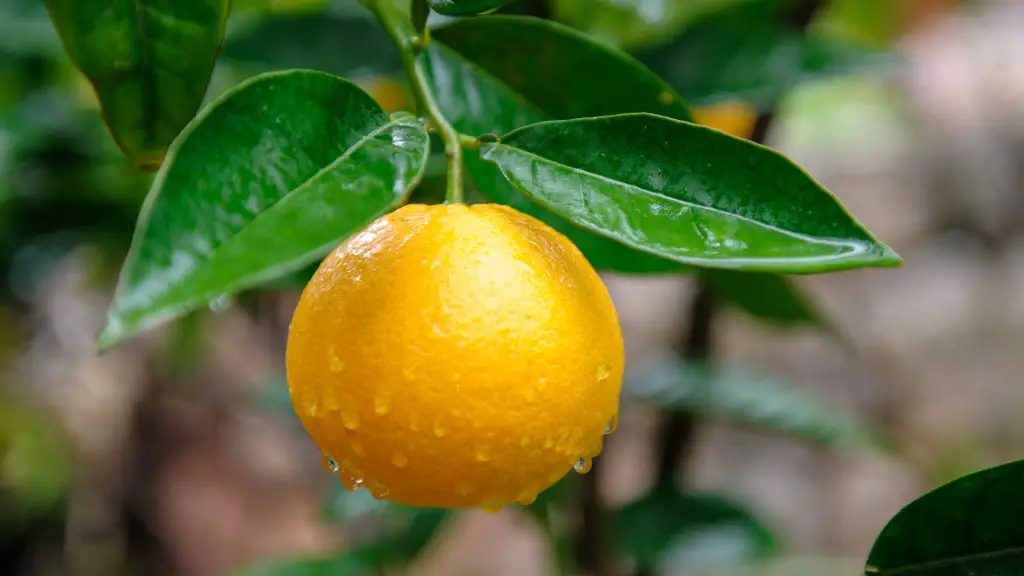Beginning a lemon tree orchard can seem daunting, but with some effort and the right know-how, you can get your trees producing plenty of bright, juicy fruit in no time. When planting your trees, it’s advisable to space them at least 3 feet apart to give them enough room to stretch out their roots. After that, here’s what to do to get your lemon tree to produce a wealth of luscious fruits.
Manage Sunlight and Water Properly
It’s important to make sure your lemon tree is getting the right amounts of sunlight and water. Optimal sunlight levels are between 6 and 8 hours a day. As for water, keep soil moist but don’t overwater, as lemon trees are sensitive to standing water and root rot. You can do a finger test to see if your tree needs water or not, should you be unsure.
Use Fertilizer Wisely
Using the right type and amount of fertilizer for your lemon tree is essential for it to produce fruit. You’ll need to use an acid-based fertilizer specifically meant for citrus trees. Additionally, know when to use the fertilizer, as this is equally as important – start fertilizing your tree between late winter and early spring. And, fertilize lightly every two months thereafter.
Trust the Process
Expect it to take around 3-5 years before your lemon tree would bear fruits. Patience and trust in the growing process is key! So, be prepared to wait it out and nurture your lemon tree with care and attention.
Prune and Thin Wisely
Pruning and thinning your lemon tree is necessary for it to bear fruit. Cut off branches, twigs and dead leaves that compete for the tree’s resources. You should also pay attention to the fruits – when they are small, thin out some of them to allow resources to be used in growing other fruits. However, try not to over-thin your tree.
Control Pests and Diseases
It’s essential to keep pests and diseases away from your lemon tree. Use insecticides, fungicides and other such treatments meant for citrus trees in order to ensure your tree stays healthy and disease-free. Additionally, be sure to inspect your tree for signs of pests and diseases, and tackle them quickly and thoroughly.
Keep an Eye Out for pests
Be vigilant for pests like whiteflies, mites, and aphids. These pests can damage the fruits, leaves, and flowers of your lemon tree if left unchecked. Physical removal can help if caught early, otherwise spray organic insecticides to rid your tree of these troublesome creatures.
Maintain Proper Nutrition
Make sure your citrus tree is getting the right type and amount of nutrients. Soil balance is essential – a soil pH below 7 is ideal. Also, it’s important to keep the soil mix of your lemon tree at a 1:1:1 ratio of sand, compost, and soil respectively. This will help your tree take up the right nutrition easily.
Ensuring Soil Quality
When preparing the soil for your lemon tree, use organic matter. If laying down roots in sandy soil, adding organic matter is important, as it helps with moisture retention and fertility. You can use manure, compost, and peat along with some small amounts of slow-release fertilizer for optimal nutrient levels.
Manage pH for Optimal Nutrition
It’s essential to keep an eye on the soil pH for optimal nutrition. The ideal pH for citrus trees is between 6 and 6.5. You’ll have to regularly test the soil and adjust it according to the citrus tree’s needs by adding lime, sulfur or other appropriate soil additives.
Protect Trees from Freezing Weather
When colder weather arrives, it’s important to protect citrus trees from the freezing temperatures. You can cover the tree up with fabric or mulch, and take extra care in pruning and fertilizing it before the winter season. Additionally, use warm water to irrigate the tree in cold weather.


